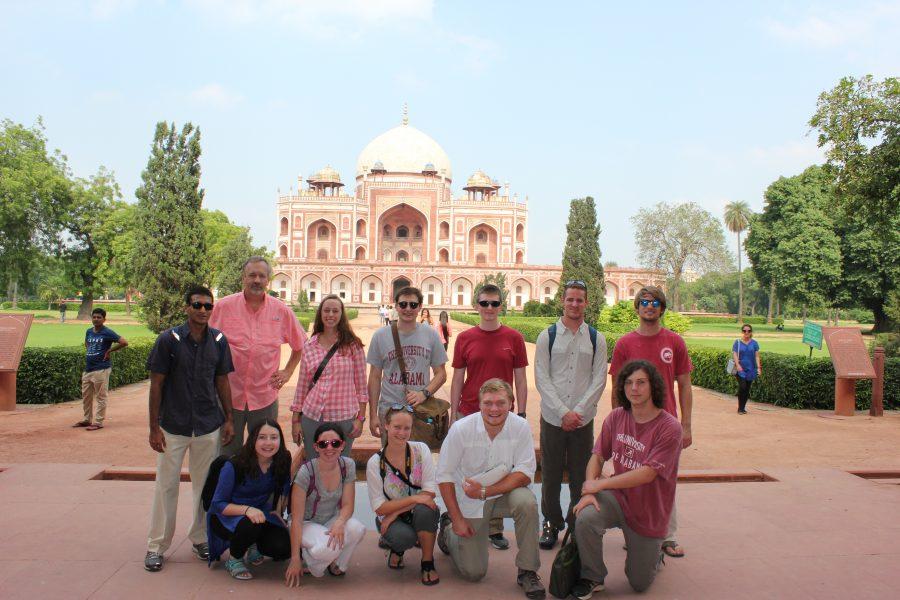Many students come into college with the desire to change the world but few get the opportunity to, especially on a global scale. That’s where Rob Morgan, executive director for Innovation Initiatives for the business school steps in.
After reading a book on a concept called reverse innovation where companies from developed markets address the needs of emerging third world markets, Morgan and his students in the Stem Path to MBA program wanted to put the concept into practice. They packed their bags, flew to Delhi, India, and spent three weeks in some of the city’s impoverished areas.
“We spent the first two [weeks] learning first hand about bottom of the pyramid, the poorest people on the planet,” Morgan said. “We went to tribal villages and urban slums where the average family was making under two dollars a day. We learned about what their needs were and then each team developed a product.”
The students were then split up into four groups identifying to four different needs in the area. Two groups dealt with city-wide issues and created a way for day laborers and employers to find each other and ensure more and better work. They also created a water filter that would rid of contaminants most people had gotten used to drinking. The groups focused on rural needs developed a product that would help farmers use cattle urine for organic farming and a way for farmers and fishermen to properly transport their food and goods to market without having to be compromised.
“It was really eye opening because when we visited remote farming villages where people really weren’t out really trying to earn money but grow enough to just feed their families,” Morgan said. “No one in those situations were starving, and they were very happy. However, we went to visit a huge slum and entire families of five, six, seven people would live in a space about a third the size of my office at the University, and they weren’t very happy but they were trying to make a better life.”
Joey Weed, a senior majoring in economics, was one of the students who worked with fishermen to meet their basic needs that had been met long ago in America.
“The most eye-opening part of this trip was the value in actually being able to go to these emerging areas,” Weed said. “You can hear United Nations statistics or read news articles about the slums, but you don’t know how that impacts what a typical family eats for breakfast or why they continue to drink dirty water.”
Rachel Ramey, a senior majoring in civil engineering, went on the trip and focused on improving water access and purification in India. She said that actually getting to be immersed in the culture helped make the country’s needs apparent and the desire to fulfill them more urgent.
“My favorite part of the trip was the visits to the community,” Ramey said. “The Indian culture was very open and inviting to us as foreigners, and they answered all our questions and were excited to tell us about their lives. One village welcomes us with a ceremony of marigold necklaces and chai tea.”
Weed said he was fascinated at how resourceful Indian farmers were, as the group discovered that cow urine has its own market. Weed said that it was crucial to immerse yourself into their culture instead of trying to fit them into your own to truly be able to address their issues.
“I’ve learned the Western way of doing things isn’t better, just different,” Weed said. “You’ve got to embrace the differences and use that to inspire new ways of doing business. With any culture, you’ve got to immerse yourself in the everyday experiences to uncover the problems, the hopes, and potential beneath the surface.”
The trip ended in August but work continues to be done in the classroom in preparation for this summer’s trip.
“This next summer we are hoping to have about a quarter of the students return from last summer to implement the solutions they’ve been working on all year and the other three quarters can begin on new projects,” Morgan said.
A team of students continue to work on these projects and have weekly Skype calls with international companies, experts in water filtration and people in India who will actually use the products. While the trip was only three weeks long, Weed said they understood it was a much bigger commitment than that, and the trip was just the beginning.
“We never would have discovered about 70 percent of our findings by sitting in a conference room in Tuscaloosa,” Weed said. “The opportunity of being in India combined with curiosity, empathy, and creativity is unstoppable.”









